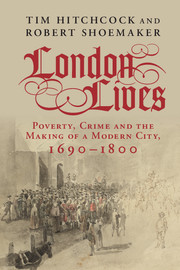Book contents
- Frontmatter
- Dedication
- Contents
- List of figures
- Preface
- Acknowledgements
- List of abbreviations
- 1 Introduction
- 2 Beggarman, thief: 1690–1713
- 3 Protest and resistance: 1713–1731
- 4 Vestries, justices and their opponents: 1731–1748
- 5 Reformers and their discontents: 1748–1763
- 6 Finding a voice: 1763–1776
- 7 The state in chaos: 1776–1789
- 8 Epilogue: The 1790s
- Bibliography
- Index
- References
7 - The state in chaos: 1776–1789
Published online by Cambridge University Press: 05 December 2015
- Frontmatter
- Dedication
- Contents
- List of figures
- Preface
- Acknowledgements
- List of abbreviations
- 1 Introduction
- 2 Beggarman, thief: 1690–1713
- 3 Protest and resistance: 1713–1731
- 4 Vestries, justices and their opponents: 1731–1748
- 5 Reformers and their discontents: 1748–1763
- 6 Finding a voice: 1763–1776
- 7 The state in chaos: 1776–1789
- 8 Epilogue: The 1790s
- Bibliography
- Index
- References
Summary
Introduction
During the 1760s and early 1770s, plebeian Londoners nursed an accumulating sense of grievance. Innovations in policing and prosecution placed those suspected of crimes at a growing disadvantage, while new poor relief policies created an ever widening chasm between parish worthies and the dependent poor. Yet through both legal and illegal means, individually and collectively, plebeian Londoners had developed and refined effective tactics for challenging authority. In this febrile context, war with America broke out in 1775, a war whose far-reaching consequences would include not only an ideological crisis over the state of English liberties but also a fundamental renegotiation of social policy in the metropolis. The interruption of criminal transportation caused unprecedented chaos in the penal system and the creation of Britain’s first mass prison population. The hardships suffered by prisoners held for years in buildings designed for short-term incarceration, or in rotting hulks on a stinking Thames, laid the foundations for keenly felt grievances. Thousands of Londoners experienced, for the first time, the pressured boredom of long days spent in powerless proximity with people just like themselves: marked, like the vast majority of criminals, by their youth, poverty and ill-luck. In the process, and despite relatively favourable climatic and economic conditions (except following demobilisation in 1783), new patterns of resistance developed.
This chapter describes these new communities of resistance, solidified through long-term imprisonment and shared suffering following 1776; communities created at a time of intense political debate. It argues that it was the new-lived, and by 1780 widely shared, experience of mass imprisonment that transformed the Gordon Riots from an anti-Catholic protest into an organised proto-revolutionary series of attacks on the prisons of London. The origins of the reconfigured system of criminal justice and poor relief that followed can be found most fully in the experience of plebeian men and women forced into desperate dialogue with judges and turnkeys, overseers and churchwardens.
- Type
- Chapter
- Information
- London LivesPoverty, Crime and the Making of a Modern City, 1690–1800, pp. 333 - 393Publisher: Cambridge University PressPrint publication year: 2015



